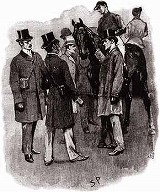“Well, well, let us see how he gets on,” said my friend imperturbably. For a few minutes he gazed through my field-glass. “Capital! An excellent start!” he cried suddenly. “There they are, coming round the curve!”
From our drag we had a superb view as they came up the straight. The six horses were so close together that a carpet could have covered them, but halfway up the yellow of the Mapleton stable showed to the front. Before they reached us, however, Desborough’s bolt was shot, and the colonel’s horse, coming away with a rush, passed the post a good six lengths before its rival, the Duke of Balmoral’s Iris making a bad third.
“It’s my race, anyhow,” gasped the colonel, passing his hand over his eyes. “I confess that I can make neither head nor tail of it. Don’t you think that you have kept up your mystery long enough, Mr. Holmes?”
“Certainly, Colonel, you shall know everything. Let us all go round and have a look at the horse together. Here he is,” he continued as we made our way into the weighing enclosure, where only owners and their friends find admittance. “You have only to wash his face and his leg in spirits of wine, and you will find that he is the same old Silver Blaze as ever.”
“You take my breath away!”
“I found him in the hands of a faker and took the liberty of running him just as he was sent over.”
“My dear sir, you have done wonders. The horse looks very fit and well. It never went better in its life. I owe you a thousand apologies for having doubted your ability. You have done me a great service by recovering my horse. You would do me a greater still if you could lay your hands on the murderer of John Straker.”
“I have done so,” said Holmes quietly.
The colonel and I stared at him in amazement. “You have got him! Where is he, then?”
“He is here.”
“Here! Where?”
“In my company at the present moment.”
The colonel flushed angrily. “I quite recognize that I am under obligations to you, Mr. Holmes,” said he, “but I must regard what you have just said as either a very bad joke or an insult.”
Sherlock Holmes laughed. “I assure you that I have not associated you with the crime, Colonel,” said he. “The real murderer is standing immediately behind you.” He stepped past and laid his hand upon the glossy neck of the thoroughbred.

“The horse!” cried both the colonel and myself.
“Yes, the horse. And it may lessen his guilt if I say that it was done in self-defence, and that John Straker was a man who was entirely unworthy of your confidence. But there goes the bell, and as I stand to win a little on this next race, I shall defer a lengthy explanation until a more fitting time.”
We had the corner of a Pullman car to ourselves that evening as we whirled back to London, and I fancy that the journey was a short one to Colonel Ross as well as to myself as we listened to our companion’s narrative of the events which had occurred at the Dartmoor training-stables upon that Monday night, and the means by which he had unravelled them.
“I confess,” said he, “that any theories which I had formed from the newspaper reports were entirely erroneous. And yet there were indications there, had they not been overlaid by other details which concealed their true import. I went to Devonshire with the conviction that Fitzroy Simpson was the true culprit, although, of course, I saw that the evidence against him was by no means complete. It was while I was in the carriage, just as we reached the trainer’s house, that the immense significance of the curried mutton occurred to me. You may remember that I was distrait and remained sitting after you had all alighted. I was marvelling in my own mind how I could possibly have overlooked so obvious a clue.”